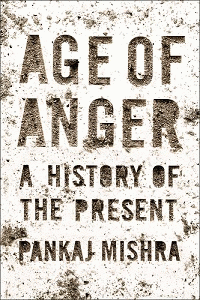From Counterpunch
Every once in a (long) while a book comes out that rips the zeitgeist, shining on like a crazy diamond. Age of Anger, by Pankaj Mishra, author of the also-seminal From the Ruins of Empire, might as well be the latest avatar.
Think of this book as the ultimate (conceptual) lethal weapon in the hearts and minds of a rootless cosmopolitan Teenage Wasteland striving to find its true call as we slouch through the longest -- the Pentagon would say infinite -- of world wars; a global civil war (which in my 2007 book Globalistan I called "Liquid War").
Mishra, a sterling product of East-meets-West, essentially argues it's impossible to understand the present if we don't acknowledge the subterranean homesick blues contradicting the ideal of cosmopolitan liberalism -- the "universal commercial society of self-interested rational individuals" first conceptualized by the Enlightenment via Montesquieu, Adam Smith, Voltaire and Kant.
History's winner ended up being a sanitized narrative of benevolent Enlightenment. The tradition of rationalism, humanism, universalism and liberal democracy was supposed to have always been the norm. It was "clearly too disconcerting," Mishra writes, "to acknowledge that totalitarian politics crystallized the ideological currents (scientific racism, jingoistic rationalism, imperalism, technicism, aestheticized politics, utopianism, social engineering)" already convulsing Europe in the late 19th century.
So, evoking T.S. Eliot, to frame "the backward half-look, over the shoulder, towards the primitive terror" that eventually led to The West versus The Rest, we've got to look at the precursors.
Smash the Crystal Palace
Enter Pushkin's Eugene Onegin -- "the first of many 'superflous man' in Russian fiction," with his Bolivar hat, clutching a statue of Napoleon and a portrait of Byron, as Russia, trying to catch up with the West, "mass-produced spiritually unmoored youth with a quasi-Byronic conception of freedom, further inflated by German Romanticism." The best Enlightenment critics had to be Germans and Russians, latecomers to politico-economic modernity.
Two years before publishing the astonishing Notes from the Underground, Dostoyevsky, in his tour of Western Europe, was already seeing a society dominated by the war of all against all in which most were condemned to be losers.
In London, in 1862, at the International Exhibition at the Crystal Palace, Dostoyevsky had an illumination ("You become aware of a colossal idea ... that here there is victory and triumph. You even begin vaguely to fear something.") Amid the stupor, Dostoyevsky was also cunning enough to observe how materialist civilization was enhanced as much by its glamour as by military and maritime domination.
Russian literature eventually crystallized crime at random as the paradigm of individuality savoring identity and asserting one's will (later mirrored in the mid-20th century by beat icon William Burroughs claiming shooting at random as his ultimate thrill).
The path had been carved for the swelling beggars banquet to start bombing the Crystal Palace -- even as, Mishra reminds us, "intellectuals in Cairo, Calcutta, Tokyo and Shanghai were reading Jeremy Bentham, Adam Smith, Thomas Paine, Herbert Spencer and John Stuart Mill" to understand the secret of the perpetually expanding capitalist bourgeoisie.
And this after Rousseau, in 1749, had set the foundation stone of the modern revolt against modernity, now splintered in a wilderness of mirrored echoes as the Crystal Palace is de facto implanted in gleamy ghettos all around the world.
Mistah Enlightened -- he dead
Mishra credits the idea of his book to Nietzsche commenting the epic querelle between the envious plebeian Rousseau and the serenely elitist Voltaire -- who duly hailed the London Stock Exchange, when it became fully operational, as a secular embodiment of social harmony.
(Note: You can view every article as one long page if you sign up as an Advocate Member, or higher).






